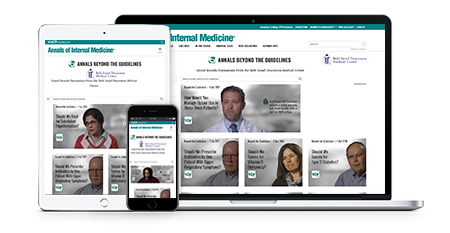Annals Beyond the Guidelines
Atherosclerotic cardiovascular disease (ASCVD) remains the leading cause of death in the United States. Reducing ASCVD risk through primary prevention strategies has been shown to be effective; however, the role of aspirin in primary prevention remains unclear. The decision to recommend aspirin has been limited by the difficulty clinicians and patients face when trying to balance benefits and harms. In 2016, the U.S. Preventive Services Task Force addressed this issue by determining the risk level at which prophylactic aspirin generally becomes more favorable, recommending aspirin above a risk cut point (>10% estimated ASCVD risk). In 2019, the American College of Cardiology and the American Heart Association issued a guideline on the primary prevention of CVD that recommends low-dose aspirin might be considered for the primary prevention of ASCVD among select adults aged 40 to 70 years who are at higher ASCVD risk but not at increased risk for bleeding. Here, 2 experts discuss how to apply this guideline in general and to a patient in particular while answering the following questions: How do you assess ASCVD risk, and what is the role, if any, of the coronary artery calcium score?; At what risk threshold of benefits and harms would you recommend aspirin or not?; and How do you help a patient come to a decision about starting or stopping aspirin therapy?
CME/MOC:
Up to 5
AMA PRA Category 1 Credits ™ and MOC Points
Expires October 12, 2024
active
Cost:
Free to Members
Format:
Video Recordings
Product:
Annals Beyond the Guidelines
From Annals of Internal Medicine (annals.org), Beyond the Guidelines is an educational feature based on recent guidelines. Each considers a patient (or patients) who "falls between the cracks" of available evidence and for whom the optimal clinical course in unclear. Presented at Beth Israel Deaconess Medical Center (BIDMC) Grand Rounds, each conference reviews the background evidence and experts then discuss the patient(s) and field audience questions. Videos of the interviews and conference, the slide presentation, and a CME/MOC activity accompany each module.



